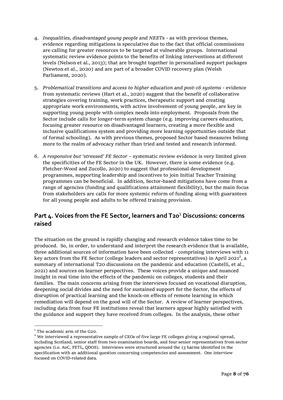
Page 8 of 76
4. Inequalities, disadvantaged young people and NEETs - as with previous themes,
evidence regarding mitigations is speculative due to the fact that official commissions
are calling for greater resources to be targeted at vulnerable groups. International
systematic review evidence points to the benefits of linking interventions at different
levels (Nelson et al., 2013); that are brought together in personalised support packages
(Newton et al., 2020) and are part of a broader COVID recovery plan (Welsh
Parliament, 2020).
5. Problematical transitions and access to higher education and post-16 systems - evidence
from systematic reviews (Hart et al., 2020) suggest that the benefit of collaborative
strategies covering training, work practices, therapeutic support and creating
appropriate work environments, with active involvement of young people, are key in
supporting young people with complex needs into employment. Proposals from the
Sector include calls for longer-term system change (e.g. improving careers education,
focusing greater resource on disadvantaged learners, creating a more flexible and
inclusive qualifications system and providing more learning opportunities outside that
of formal schooling). As with previous themes, proposed Sector based measures belong
more to the realm of advocacy rather than tried and tested and research informed.
6. A responsive but 'stressed' FE Sector - systematic review evidence is very limited given
the specificities of the FE Sector in the UK. However, there is some evidence (e.g.
Fletcher-Wood and Zucollo, 2020) to suggest that professional development
programmes, supporting leadership and incentives to join Initial Teacher Training
programmes can be beneficial. In addition, Sector-based mitigations have come from a
range of agencies (funding and qualifications attainment flexibility), but the main focus
from stakeholders are calls for more systemic reform of funding along with guarantees
for all young people and adults to be offered training provision.
Part 4. Voices from the FE Sector, learners and T201 Discussions: concerns
raised
The situation on the ground is rapidly changing and research evidence takes time to be
produced. So, in order, to understand and interpret the research evidence that is available,
three additional sources of information have been collected - comprising interviews with 11
key actors from the FE Sector (college leaders and sector representatives) in April 2021
2, a
summary of international T20 discussions on the pandemic and education (Castelli, et al.,
2021) and sources on learner perspectives. These voices provide a unique and nuanced
insight in real time into the effects of the pandemic on colleges, students and their
families. The main concerns arising from the interviews focused on vocational disruption,
deepening social divides and the need for sustained support for the Sector, the effects of
disruption of practical learning and the knock-on effects of remote learning in which
remediation will depend on the good will of the Sector. A review of learner perspectives,
including data from four FE institutions reveal that learners appear highly satisfied with
the guidance and support they have received from colleges. In the analysis, these other
1 The academic arm of the G20.
2
We interviewed a representative sample of CEOs of five large FE colleges giving a regional spread,
including Scotland, senior staff from two examination boards, and four senior representatives from sector
agencies (i.e. AoC, FETL, QDOS). Interviews were structured around the 13 harms identified in the
specification with an additional question concerning competencies and assessment. One interview
focused on COVID-related data.